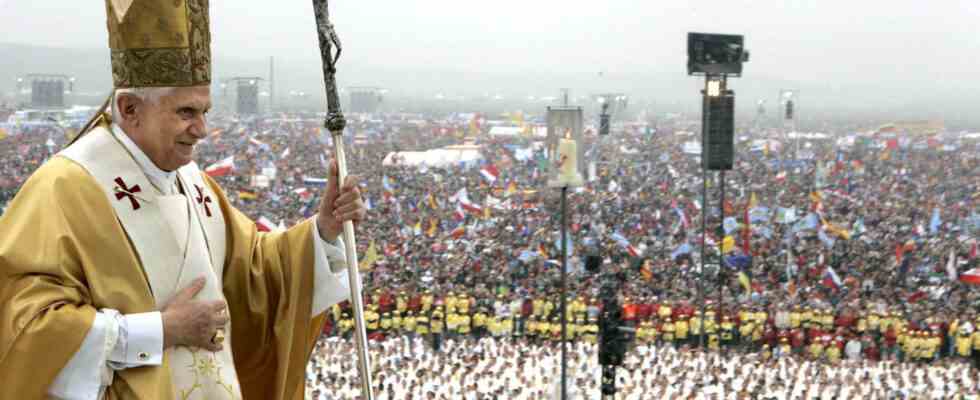analysis
Status: 05.01.2023 08:03
In the Vatican today the late Benedict XVI. said goodbye. The Germans, the Church and “their” Pope – it was a difficult relationship.
Joseph Ratzinger, the first German to take the papal throne in 500 years, was always proud of his German and Bavarian roots. In the will, which was published immediately after the death of the emeritus pope, he thanks the people in his homeland “for the fact that I was always able to experience the beauty of faith with them”. And he asks his “dear compatriots” not to be dissuaded from their faith.
The heartfelt words, the friendly tone with which the Pope thinks of his homeland, are probably also due to the date the will was drafted: August 26, 2006. That was after “We are Pope”, after Benedict’s acclaimed performance at the World Youth Day in Cologne and shortly before the visit to Bavaria, in September 2006. The Germans and “their” Pope have been reconciled. That’s how it seemed then.
Conservative Keeper
This relationship history was never without tension. As a young professor, Joseph Ratzinger was deeply traumatized by the student protests of the 1968 generation at the University of Tübingen. A reform-oriented, open theologian became a conservative keeper. One who, as prefect of the Congregation for the Doctrine of the Faith, strictly punished deviations from the Catholic norm. Theologians, bishops were sanctioned.
25 years ago, the German bishops’ conference received a clear request to withdraw from state counseling for pregnant women. Participation in a system that could end in an abortion was unthinkable for Cardinal Ratzinger. The fact that the church was not allowed to compromise itself counted more for him than the German bishops’ desire to protect unborn life through counseling offers.
Uncompromising in matters of faith and morals
Joseph Ratzinger first wanted to protect his church; he made no compromises when it came to questions of faith and morals. A sentence like that of his successor Francis “Reality is more important than the idea” would never have crossed his lips. The ideal church was more important to him than the reality of life and faith of many Catholics.
With his election as Pope on April 19, 2005, that faded into the background. And at home, people rubbed their eyes in amazement at how open Benedict XVI. approached the people. There was even a meeting with his greatest theological adversary, the Swiss Hans Küng, a few months after the election.
Relativism as a devilish temptation
But Benedict remained true to his principles. The struggle against relativism became the hallmark of this pontificate. Relativism, that was for Pope Benedict XVI. the devilish temptation of the zeitgeist, an attitude that ignores absolute truths. Benedict’s speech about the “dictatorship of relativism”, on the other hand, made reforms more difficult and categorically ruled out compromises in matters of faith or questions of morality. And so there was no change even in the fields in which one would have credited the pope from the country of the Reformation with something. For example in ecumenism. Surprisingly, Evangelical-Catholic relations deteriorated during his pontificate. In the end, there was talk of an “ice age” for ecumenism.
Over the years in office, Benedict lost popularity. That is completely normal, even Pope Francis is no longer as popular today as he was in the first months after his election. Then there was the abuse scandal – in the USA, in Ireland, in Germany. Gradually it became known that Catholic clergymen had abused children and young people and were even protected by their church. As prefect of the Congregation for the Doctrine of the Faith, Joseph Ratzinger tightened the rules to combat abuse within his own ranks. But until the very end he had to put up with critical questions about his own responsibility.
And there were also mishaps, misjudgments with serious consequences, for example the “Williamson Affair”. In 2009, the Pope lifted the excommunication of four bishops from the breakaway Society of St. What was intended as a gesture of reconciliation with the traditionalist wing in the church turned out to be a mistake. One of those rehabilitated was Holocaust denier Richard Williamson. Even the German Chancellor criticized Pope Benedict for this.
“Leap-Ready Hostility”
Benedikt met this and other criticism. He spoke of “hostility ready to jump,” which hurt him especially when it came from Germany. The relationship between the German Pope and his homeland had cooled. This applies above all to the Catholic Church in Germany.
In a speech in Freiburg in September 2011, Benedict XVI. understand that German Catholicism is determined too much by money and institutions and not enough by faith. He had retained a different image of the church, shaped by his childhood in Upper Bavaria, in the Third Reich, where he had experienced his church as a wagon camp against National Socialism, firmly rooted in tradition, alive in the celebration of mass. Of course, Joseph Ratzinger noticed that this picture no longer corresponds to reality, but did not accept it. His last words, handed down in the will, are a defiant appeal: “Stand firm in your faith! Don’t let yourselves be confused!”

